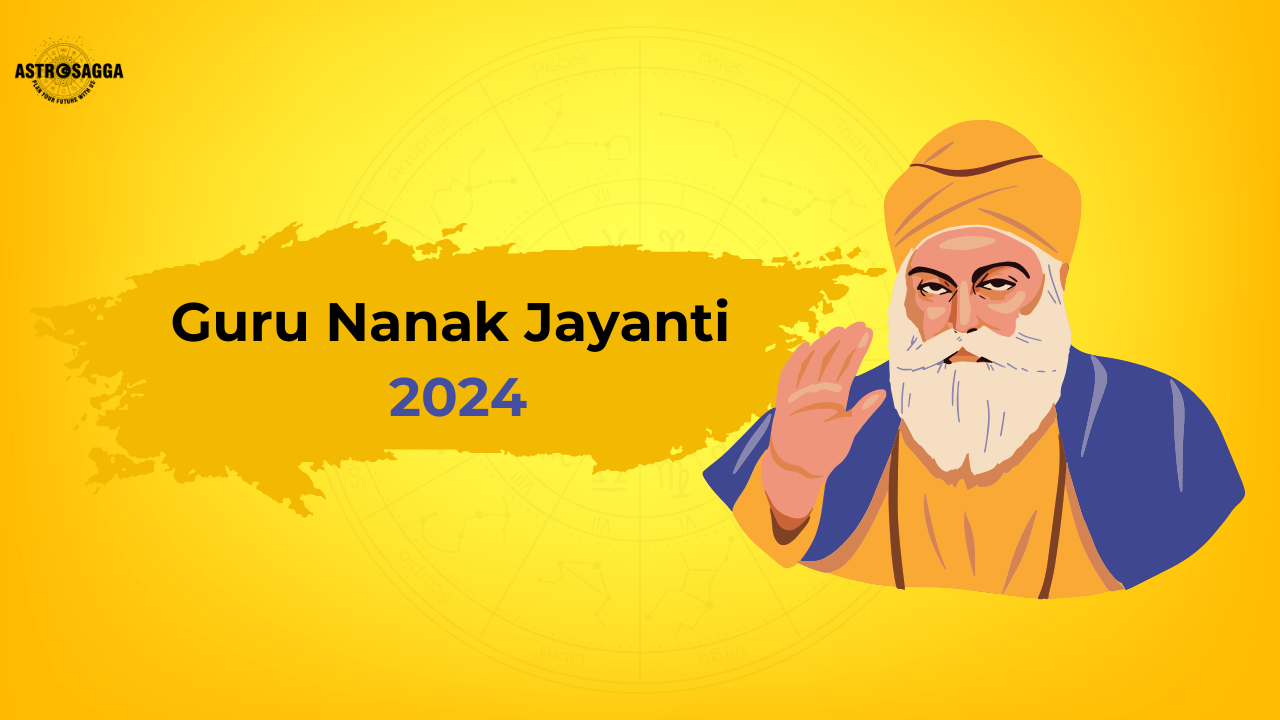Guru Nanak Jayanti, also known as Gurpurab or Guru Nanak’s Prakash Utsav, marks the birth anniversary of Guru Nanak Dev Ji, the first Sikh Guru and the founder of Sikhism. Celebrated by Sikhs and devotees around the world, this day is a tribute to Guru Nanak’s teachings of love, compassion, and unity. Falling on the auspicious full moon day in the Kartik month of the Hindu calendar, Guru Nanak Jayanti in 2024 is observed on November 15.
In this blog, we’ll explore the historical background, significance, rituals, and key timings for Guru Nanak Jayanti 2024.
1. Historical Background of Guru Nanak Jayanti
Guru Nanak Dev Ji was born in 1469 in Talwandi, a village now known as Nankana Sahib in modern-day Pakistan. From a young age, Guru Nanak displayed a deep sense of spirituality, often questioning societal norms and seeking answers about life, God, and the universe. His teachings emphasized the values of compassion, humility, and truth.
Guru Nanak’s contributions to society and spirituality were revolutionary for his time. He advocated a monotheistic belief system, rejected the rigid caste divisions, and promoted equality and respect for all individuals, irrespective of their background. Throughout his life, he traveled widely, spreading the message of divine unity and love. His words and teachings were later compiled in the Guru Granth Sahib, the sacred text of the Sikhs.
Read Also - Chhath Puja 2024: Dates, Rituals, and Significance
2. Significance of Guru Nanak Jayanti
Guru Nanak Jayanti is one of the most significant festivals in Sikhism and is celebrated with devotion and enthusiasm by Sikhs and others around the world. The festival underscores the values of equality, love, and selfless service.
Guru Nanak’s message was one of unity and compassion, standing against discrimination, exploitation, and injustice. His teachings continue to guide humanity toward a harmonious way of life that transcends religious boundaries. Guru Nanak Jayanti reminds us to live a life of humility, integrity, and compassion.
The festival also serves as a reminder of Guru Nanak’s “Three Pillars of Sikhism”:
Naam Japna: Meditate and chant God’s name to cultivate inner peace and enlightenment.
Kirat Karni: Earn an honest livelihood without deceit or exploitation.
Vand Chakna: Share resources with those in need, fostering community and equality.
3. Key Rituals and Celebrations on Guru Nanak Jayanti
The celebration of Guru Nanak Jayanti typically spans several days and includes various rituals and events that highlight the spiritual significance of the day. Let’s take a look at some of these key rituals:
a) Akhand Path
The festivities begin with an Akhand Path, a continuous 48-hour reading of the Guru Granth Sahib, the holy scripture of the Sikhs. This uninterrupted recitation starts two days before Guru Nanak Jayanti. The Akhand Path is performed in Gurdwaras or Sikh temples and is a revered ritual that signifies devotion to Guru Nanak’s teachings.
Listening to the recital is believed to bring peace, wisdom, and a deep connection to the Guru’s message.
b) Prabhat Pheris
Prabhat Pheris are early morning processions conducted in the days leading up to Guru Nanak Jayanti. Devotees gather at Gurdwaras and then proceed through the local neighborhoods, singing hymns and verses from the Guru Granth Sahib. These processions fill the air with spirituality and invoke a sense of community among devotees.
c) Nagar Kirtan
One of the most distinctive rituals of Guru Nanak Jayanti is the Nagar Kirtan, a grand procession organized on the day before the festival. This procession involves carrying the Guru Granth Sahib in a beautifully decorated palanquin, led by the Panj Pyare, or the five beloved ones. Streets are adorned with flags, and devotees sing devotional hymns.
The Nagar Kirtan often includes Gatka performances, a Sikh martial art showcasing swordsmanship and bravery. The colorful and vibrant procession attracts large crowds, celebrating Guru Nanak’s teachings and principles.
d) Kirtan and Prayers
On the day of Guru Nanak Jayanti, Gurdwaras organize special kirtan sessions and prayers. Devotees gather to sing hymns and recite verses, creating a spiritually uplifting environment. These gatherings provide an opportunity for people to reflect on Guru Nanak’s teachings and seek blessings.
e) Langar – The Community Kitchen
The Langar is one of the most cherished rituals during Guru Nanak Jayanti. Langar is a community kitchen where food is prepared and served to everyone, regardless of their background. Volunteers in Gurdwaras prepare the meal, serve it, and clean up afterward as an act of devotion. Langar reflects the principle of equality, kindness, and selfless service, all of which are central to Guru Nanak’s teachings.
4. Guru Nanak Jayanti 2024 Timings and Schedule
Guru Nanak Jayanti is celebrated on the full moon day, or Purnima, in the Kartik month of the Hindu calendar. The Purnima Tithi signifies spiritual purity, and it is considered an auspicious time to engage in prayer and reflection.
For Guru Nanak Jayanti 2024, the important timings are as follows:
Purnima Tithi (Begins): 9:20 AM on November 14, 2024
Purnima Tithi (Ends): 11:45 AM on November 15, 2024
Gurdwaras organize their programs to align with these timings, beginning with early morning prayers, kirtans, discourses, and concluding with Langar.
5. Teachings of Guru Nanak Dev Ji
The teachings of Guru Nanak Dev Ji transcend religious boundaries and speak directly to the human soul. His principles are timeless, and his words continue to inspire countless individuals. Let’s look at some of his core teachings:
Ek Onkar (One God): Guru Nanak emphasized the concept of Ek Onkar, or “One God.” He taught that there is only one formless, eternal God, present in all beings.
Equality: Guru Nanak rejected caste discrimination and promoted equality, teaching that everyone is equal in the eyes of God.
Selfless Service: One of Guru Nanak’s teachings was the importance of selfless service, reflected in the tradition of Langar and community service.
Respect for Nature: Guru Nanak believed in the interconnectedness of all life and urged followers to respect and care for nature.
6. Global Celebrations and Legacy
Guru Nanak Jayanti is celebrated around the world wherever Sikh communities reside. Major celebrations take place at the Golden Temple in Amritsar and at Nankana Sahib, Guru Nanak’s birthplace in Pakistan. Gurdwaras in Canada, the United States, the United Kingdom, and other countries hold special services and Langar, bringing people from all communities together.
In recent years, Guru Nanak’s teachings have gained a universal appeal beyond the Sikh community, resonating with those who value compassion, tolerance, and selfless service. Events like talks, seminars, and community service initiatives are organized globally to honor his legacy.
7. Conclusion
Guru Nanak Jayanti is not just a festival; it is a call to action for embodying the teachings of Guru Nanak in our everyday lives. His emphasis on unity, humility, and compassion is especially relevant today. Guru Nanak showed the path to a fulfilling and balanced life through devotion, honest work, and sharing with others.
As we celebrate Guru Nanak Jayanti 2024, let’s take a moment to reflect on his teachings and strive to practice them in our lives. By following the principles of Naam Japna, Kirat Karni, and Vand Chakna, we can contribute to a more compassionate and inclusive world, staying true to the values taught by Guru Nanak Dev Ji.
Want to understand your relationships better? Talk to the friendly astrologers at AstroSagga for personalized readings and advice.












